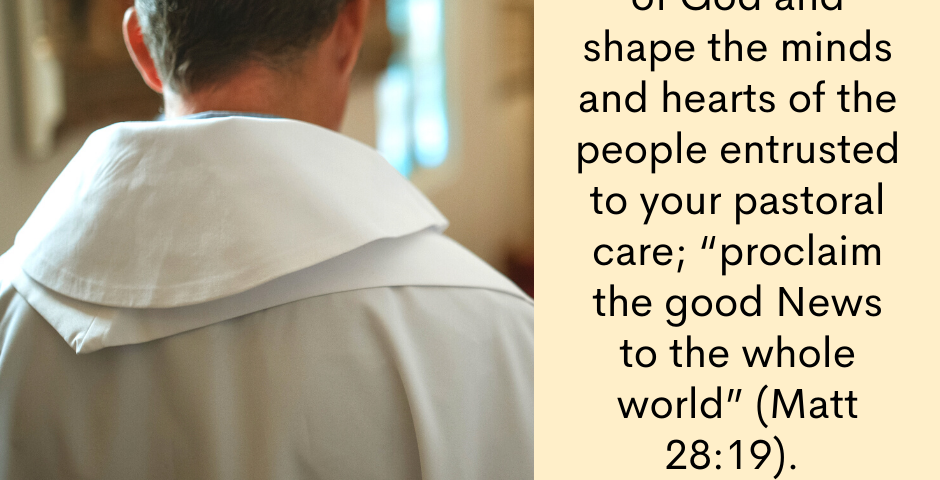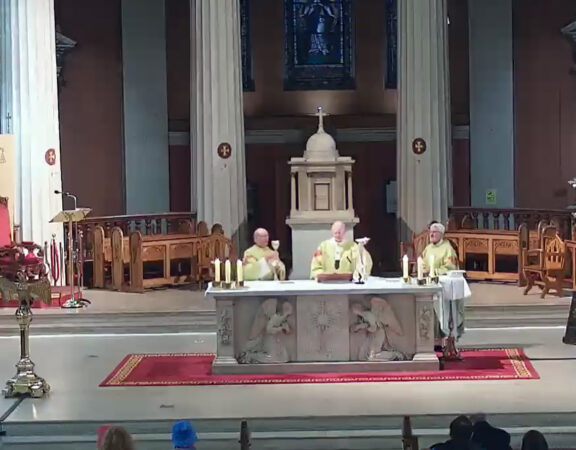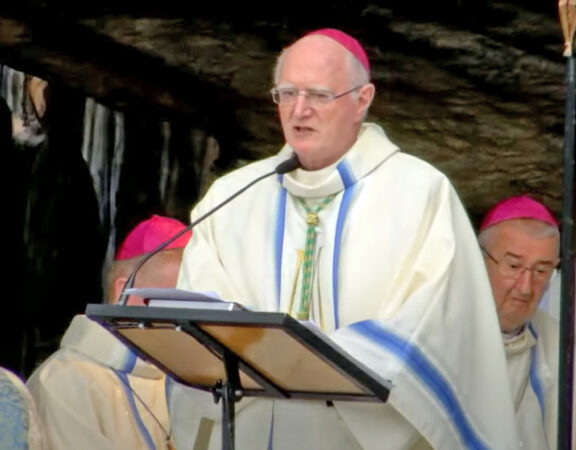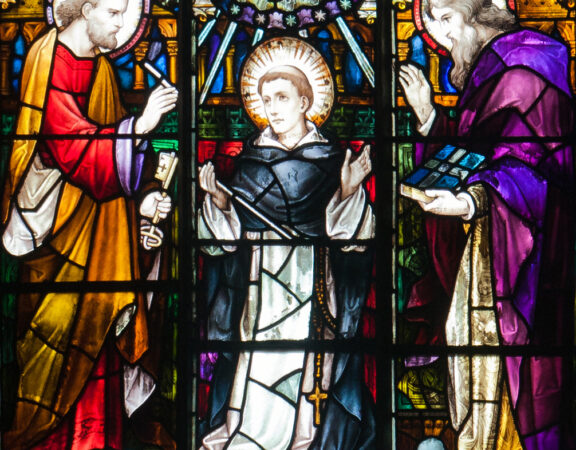Homily of Archbishop Dermot Farrell for the Ordination to the Priesthood
of Joseph Keegan,
Church of the Most Precious Blood, Cabra
20th February 2022
I welcome you to the ordination ceremony this afternoon; I welcome Joseph; your parents, Andrew and Alice; your family members’ and extended family. I also welcome my brother priests as we come to pray with and for, and ordain Joe to the priesthood. This is an important day for the Archdiocese, as the ordination of a priest is one of the high points in the life of a Diocese.
There are a number of things that I feel it is important to say today. The vocation of the priest as Teacher, Priest and Shepherd. The mission of the priest. The importance of personal prayer and the Word of God in the life of the priest. The changing face of our Church—the challenges and opportunities.
Many years of preparation have taken place for this day. Through your careful discernment and prayer, you have discovered that God has called you to this vocation, and now you are responding with your whole heart. Today, the Church entrusts to you this sacred ministry of priesthood. Through the laying on of hands, you will share in Christ’s sacred ministry.
You are called in your priestly ministry to become more and more like Christ the Priest, Teacher, and Shepherd. The primary vocation is to holiness. As a Priest you will sanctify the people of God through the celebration of the sacraments. To be a priest is to make people holy, and the sacraments are the primary means of nourishing the spiritual life of the people of God. The call is to cultivate a friendship between God and the people. As a Teacher you will speak Word of God and shape the minds and hearts of the people entrusted to your pastoral care; “proclaim the good News to the whole world” (Mark 16:15; cf. also Matt 28:19). As a Shepherd you will govern and order the gifts the people have received from the Lord towards the realisation of the Kingdom of God. So, passionately love the people you serve, sanctify them, teach them, shepherd them. You are called to lead by serving. “I did not come to be served, but to serve” (Matt 20:28; Mark 10:45; John 13:1-17).
“Mission is at once a passion for Jesus and a passion for his people” (Pope Francis, Address to Symposium on Priesthood, February 2022). Without daily prayer, both personal and prayer of Church, and being closely involved in the real lives of people, the mission you are about to embark upon will be seriously impaired. The priest is a bridge for others in their meeting with Jesus Christ; he is someone who connects heaven and earth (cf. Pastores dabo vobis 43). “As a priest you must be able travel down far enough to reach the lost of the lost, and at the same time reach up high enough to facilitate the journey to heaven” (Robert Barron).
There is the risk of thinking of yourself simply as a dispenser of sacred things, especially with the reduction in the number of priests in the Archdiocese. The People of God, however do not want a ‘clerical functionary’ or a ‘professional of the sacred’— but as Pope Francis put it on Thursday last, they hope to find a shepherd “filled with compassion, opportunity, a courageous man, capable of stopping before one who is wounded and showing concern.” The People of God want a man “of courage, ready to draw near to those in pain and lend a helping hand. They desire a contemplative man, “whose closeness to people, enables them to proclaim before the wounds of our world the power of the Resurrection even now at work.”
Today you are asked: “are you resolved to exercise the ministry of the Word worthily and wisely, preaching the Gospel and explaining the Catholic faith?” As a priest you are called to listen attentively to the Word of God, to pay attention to it. Be open to it, allowing it to nurture your life and inspire you to live out the call of Christ in your daily life. Priests need to listen attentively to the Sacred Scriptures, study them assiduously, reflect on them carefully, and interpret them “in the light of the same Spirit through whom they were written” (Pope Francis, Aperuit Illis 12). When our hearts and minds are open to the presence of Christ in the Scriptures, our relationship with Christ will change who and how we are.
Sacred scripture is at the centre of everything the Church does. The scriptures nourish and shape our prayer and our worship. They help us understand our world. They shape our world view. They continually challenge us to live out the Word of God in our lives. They teach us how to live and relate to each other.
It is His Gospel that you proclaim and preach, not yours; it is the Word of God, not our own word! (2 Cor 4:5). It is the Word, however, that we must make our own. It must be preached without compromise, without accommodation, fear or hesitation. Your words, your deeds, your conduct, and your demeanour must show people the face of the Good Shepherd. We speak not merely with words but with our life. Let the Spirit inscribe the Word on your heart so that your lips may utter words of wisdom and love. As a priest, you are to further the Church’s sacramental and liturgical life, celebrating the Eucharist, baptizing, reconciling sinners, witnessing marriages, and anointing of the sick in the name of the Lord.
Some might hold that it is not a great time to be a priest. I hold the opposite view. Undoubtedly, ours is a time of big challenges, but it is also a time rich with great possibilities. So, “put out into the deep” (Luke 5:4) with a hope born of a conviction that transcends these difficult times through which we are living, and a humility that transcends the limits of your own capabilities. Seize the moment and live your calling in a dynamic and dedicated way, while not avoiding the reality of the situation in which you find yourself. There is no doubt the Church in Dublin is changing profoundly in how it provides ministry; seeking comfort by racing into the future is as illusory as seeking to re-construct an idealised past. It is in the present we have to live. The changes in the practice of the faith that we are experiencing cannot leave us indifferent. As human and material resources continue to contract, we must envisage how we will preach the gospel beyond the usual frameworks. One thing is clear, the new face of the organisation of the church in the Archdiocese will be different. Joe, accept responsibility for the mission as you experience it now, rather than hankering after the glory of the past. As he said to Zacchaeus, “it is today that the Lord wants to stay in our house” (see Luke 19:5). And the Lord is faithful to his word. The future then is God’s gift to you and to the people you will serve. Embrace the gift of God. It is the way to life.
Joe, during the ceremony today, I will present you with the paten and chalice containing the gifts to be offered in the Eucharist, saying “Accept from the holy people of God the gifts to be offered to him. Know what you are doing, and imitate the mystery you celebrate, model your life on the mystery of the Lord’s cross.” In imitation of the Lord, we too must give ourselves away utterly. The cross is a symbol of total self-giving. “It is more blessed to give, than to receive” (Pope Francis, The Joy of the Gospel, 272). Joe, embrace the cross, embrace the way of God.
I join with your own family, in warmly congratulating you and in doing so, I congratulate your parents, your family and all who have been involved in your formation for the way in which they have contributed to making you the person that you are, ready to go forward “so the Gospel may reach the ends of the earth, and the family of nations, made one in Christ, may become God’s one, holy people (Prayer of Consecration, Liturgy of Ordination).
END








